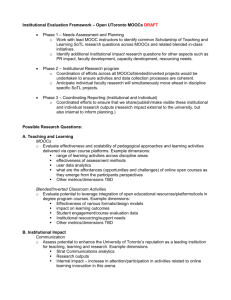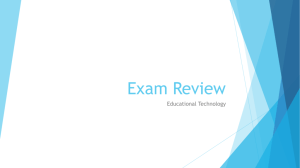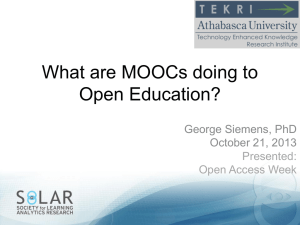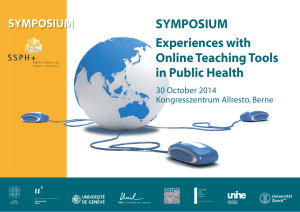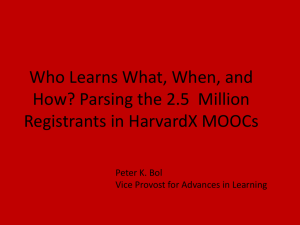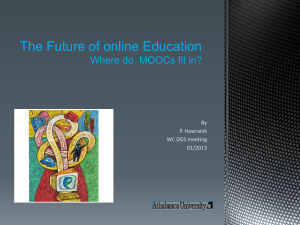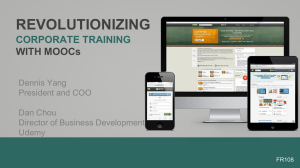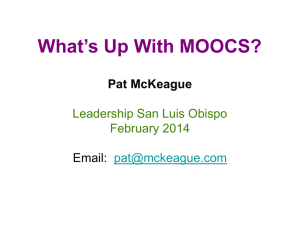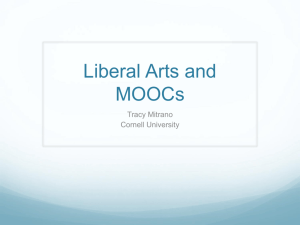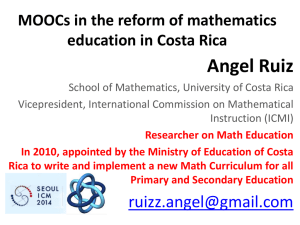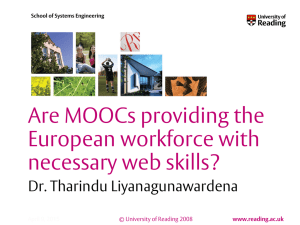research at TU Delft - Centre for Education and Learning
advertisement
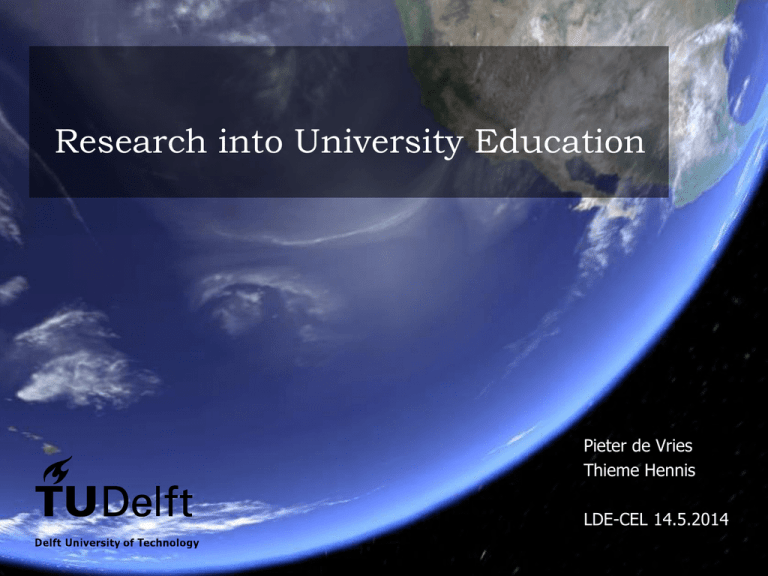
Research into University Education Pieter de Vries Thieme Hennis LDE-CEL 14.5.2014 Vision ‘Educate the world & enhance quality of campus & online education’ Advancement of educational ‘productivity’ through research with a shift from institute to learning ecosystem Research based Education • Shift happens: • From management to teacher tool; • From ad-hoc/experience to research based innovation; • From disconnected and distributed to connected and complementary • From interval-based to realtime (dashboard) • Online learning creates the momentum Open & Online portfolio • 2013-2014: 11 MOOCs on edX • Finished: Solar Energy & Water Treatment • ≈ 5.000 Certificates of Completion • No Credits Massive Open Online Courses (MOOCs) Open Course Ware (OCW) Campus Education • 19.000 on-campus students • Bachelor – Master – Phd • 2 blended Bachelors Online Distance Education (ODE) • • • • • More than 120 courses online & 10.000 weblectures recorded • Unique visitors > 800 /day • No interaction with faculty • No accredited certificate 1 full online master (25 courses) 2 modules, 1 minor, 1 master (6 courses) 50 students (30 on-campus) Full Master Degree / Accredited Course Certificate MOOCs on edX • Fall 2013: • Solar Energy • Introduction to Water Treatment • Spring 2014: • Aeronautical Engineering • Credit Risk Assessment • Next Generation Infrastructures • Fall 2014: • • • • • • • Delft Design method Responsible Innovation Technology for Bio-Based Products Introduction to Functional Programming Introduction to Water & Climate (onderdeel v reeks) Solving Complex Problems Solar Energy (Flipped + MOOC, second time) MOOCs & Research • Research interests include: • Student population and their online behavior (social learning, strategies, SRL) • Course design/didactics: each MOOC is different → from more active and project based to traditional lecturing • Tools used for learning and online collaboration (forum, social media, other tools) • Workflow and support: different teachers, different preferences, different requirements • Learning analytics & tools • Revenue models • And of course: cross-fertilization between MOOCs, campus education, and Extension School • Example: Flipped Classroom experiment Solar Energy (Fall 2014) Extension school as Organizational Framework (Harvard-like) • At Harvard University’s primary resource for continuing education courses for a century, you’ll find open-enrollment classes in nearly 60 fields. • Attend evening classes on campus in Harvard Square. • Choose from more than 200 Harvard online courses, including Harvard College lectures. • Earn undergraduate or graduate credit or take a course for noncredit. • Take five courses in a focused area and earn one of our professional on-campus. Strategy • Experiment with open & online education in order to find new revenue models • Focus the online portfolio on Dutch and upcoming global markets for continuing education (post-initial / BRIC) • Strengthen research & education networks and collaboration with partners in edX • Incorporate online modules in regular curriculum & innovation of online didactics Educational business column • • • • • • Management Organization Teaching and learning process Content Technology Business model Learning innovation activities • Design education – IO • Blended learning • • • • • Renate Klaassen (3TU Centre for Engineering Education) EWI – Flipped classroom L&R - Peer instruction TBM - BSc blended learning curriculum CITG – Virtual labs, blended CITG-KO OC Focus – Blended version of BKO • Online learning • Extension school, MOOCs, SPOCs • Online master (CITG, TBM, L&R) • Staff development • Digital assessment / assessment for learning • Architecture, IO, 3ME, EWI • Multidisciplinary projects • Entrepreneurial minor, Bio-inspired design, Industrial ecology, Green Village Research in Education (PhD) Maartje van den Bogaard • Student success in higher education • Learning analytics and academic analytics • Online learning and authentic learning environments Thieme Hennis • MOOCs as research objects and research instruments • Applying motivational/psychological concepts in online education • Participatory learning for disengaged learners Ebrahim Rahimi • • • • Personalization of learning process using technology Competency development Facilitating self-regulated and self-directed learning Designing and developing Personal learning environments using Web 2.0 Research in Education • Advancement of research based teaching and course-design • Online learning in Higher Engineering Education • Self-directed learning in an authentic learning environment. • Micro learning management for informal and experiential learning (at the workplace). Open research and open innovation
